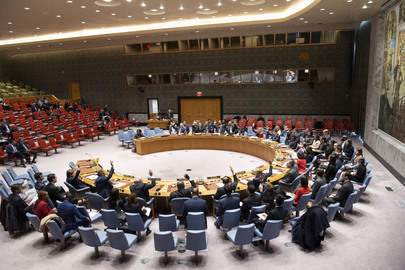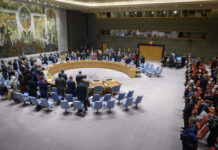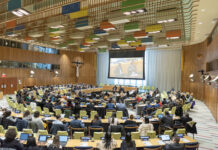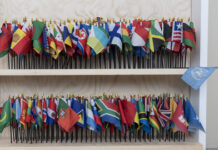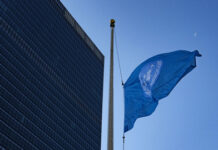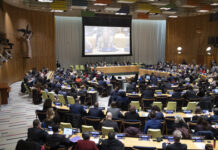This is the News in Brief from the United Nations.
In Gaza, the situation in Rafah is dire say UN agencies, amid reports that Israeli forces have conducted a military operation inside the Nasser Hospital Complex in the south.
The World Health Organization (WHO) chief Tedros Adhanom Ghebreyesus reported on Wednesday the agency had lost contact with hospital personnel, adding that two UN missions had been denied in the last four days.
Fears also loom over the continuing threat of an Israeli invasion of Rafah – where 1.5 million displaced Palestinians are seeking shelter and safety.
In its latest situation update, UN humanitarian aid agency, OCHA, reported population movements heading away from the southern border city.
Meanwhile, across Gaza, the Palestinian death toll of mostly women and children has risen above 28,000, according to the health ministry.
Israeli authorities report that 230 Israeli soldiers have been killed since the war began on 7 October following the Hamas-led terror attack.
Some 134 hostages remain captive in Gaza, according to Israeli authorities.
World had warmest January on record
In the battle to arrest climate change, January was the hottest month on record. That’s according to the World Meteorological Organization (WMO).
Global precipitation reached a near record-high in January on the heels of a record wet December.
Large portions of North America, Asia and Australia were wetter than average while much of southern Africa and South America were drier than normal.
The record-breaking trend seen for much of 2023 has rolled into 2024. For the eighth month in a row, new heat records have been set.
At the same time, sea surface temperatures have been at a record high now for 10 consecutive months.
This new data comes from the US National Oceanic and Atmospheric Administration (NOAA), NASA, the European Union’s Copernicus Climate Change Service and the Japan Meteorological Agency.
They are four of the six international datasets feeding into WMO’s State of the Climate reports.
That report is due out next month. But, so far, the agency has already confirmed that 2023 was by far the warmest year on record due to human-induced climate change and a warming El Niño weather pattern.
International Childhood Cancer Day: Parental role vital
On this International Childhood Cancer Day, the UN health agency, WHO, said parents alongside family doctors and paediatricians play a vital role in early detection.
Globally, more than 1,000 children are diagnosed with cancer every day. Recent medical advances have boosted chances of survival in high-income countries, where more than 80 per cent of children diagnosed will survive.
But, only about 20 per cent of kids diagnosed will survive in some low and middle-income countries.
To change that, WHO launched the Global Initiative for Childhood Cancer in 2018. Its main goal is to reduce that survival gap by 2030.
It aims to ensure that at least 60 per cent of children with cancer worldwide will survive their diagnosis.
WHO said reaching this goal hinges on strengthening health systems so that primary health providers – including parents – are able to spot the early signs of childhood cancer.
Also important is a referral system which can provide specialized care.
Matt Wells, UN News.
Source of original article: United Nations (news.un.org). Photo credit: UN. The content of this article does not necessarily reflect the views or opinion of Global Diaspora News (www.globaldiasporanews.com).
To submit your press release: (https://www.globaldiasporanews.com/pr).
To advertise on Global Diaspora News: (www.globaldiasporanews.com/ads).
Sign up to Global Diaspora News newsletter (https://www.globaldiasporanews.com/newsletter/) to start receiving updates and opportunities directly in your email inbox for free.


